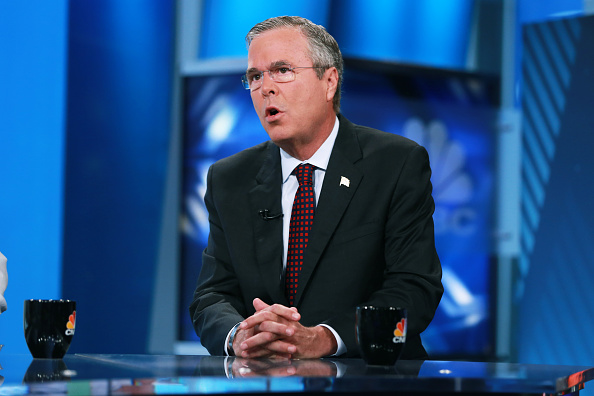
Jeb Bush took his stage armed with a detailed economic plan that would dramatically cut taxes for most Americans and the biggest businesses. He was proud of his proposal to end inheritance taxes on estates of any size and change how married couples to calculate their joint income. For the self-professed policy wonk, this was where he wanted to run his campaign for President.
Then the specter of Donald Trump appeared.
Toward the end of the campaign event in Raleigh, North Carolina, a questioner tossed Bush what would generously be described as a softball question, and the former Florida governor veered a little off script to attack Trump.
“We always hear politicians promising to cut taxes and I have to say, ‘I’m skeptical that they’ll actually be able to get the job done,’” the questioner began. “Can you convince us that you can actually accomplish what you’ve outlined in this plan?”
Bush responded by dinging Trump and implicitly 2012 Republican nominee Mitt Romney, who made broad economic promises but never fleshed out the details enough that economists could evaluate them.
MORE: Bush Goes After Trump in His First Campaign Ad of 2016
“The first thing you do is you don’t have a secret plan. You have a full plan. You have to be willing to take a chance,” he said. He contrasted that with his approach Wednesday, arguing that he his plan was a thoughtful way to cut rates and close loopholes. “I’ve laid out a plan that has the most details of any candidate running for office,” he said.
That may be true, although that’s not saying much at this stage in the game. Budget experts who looked at the backgrounder provided by the Bush campaign found some things to like as well as some major unresolved questions that would make it hard to evaluate the proposal’s effect on the deficit.
Maya MacGuineas, president of the Committee for a Responsible Federal Budget, called the Bush proposal “a good starting place” because it would simplify the tax code and get rid of some tax breaks. But she said it’s impossible to know for sure exactly how much money the Bush proposal would cost the government.
“There’s not enough to figure out anything conclusively,” she said.
Liberal budget-watchers were not as generous. Harry Stein, director of fiscal policy at the Center for American Progress Action Fund, the advocacy arm of the liberal think tank Center for American Progress, said the plan did not appear revenue-neutral, meaning it would reduce the amount of tax money coming into the government.
“We do know that very rich people will get huge tax cuts from this,” Stein said, noting the changes in how the tax rates for top earners were shrinking. “There will still be important question marks that we need to digest.”
At the end of the Raleigh event, Bush was done with policy. He had made his pitch for three tax brackets instead of the current seven, increasing standard deductions and phasing out specific ones. He turned instead to politics, arguing that Trump and other Republican rivals were full of bluster.
“You know, this political environment we’re in now, where the louder voices just turn up the volume and that’s a sign of leadership? It isn’t,” Bush said. “People know that.”
Instead, Bush suggested, leadership meant having convictions and policies to match them. “It is the only way big ideas will be implemented in Washington, D.C.”
Meanwhile, back in Washington, Trump and Texas Sen. Ted Cruz were holding a rally on the steps of the U.S. Capitol against a proposed Iran nuclear deal. Cable news networks showed the protest live while giving short shrift to Bush’s wonkier event.
But Bush, whose first campaign ad also took a jab at Trump, was getting more comfortable knocking the frontrunner, although in a typically understated way.
“Don’t demonize people who disagree with you,” he added. “I don’t have the skill sets required—and I never want them—where you push someone down who disagrees with you.”
Read Next: Donald Trump and Ted Cruz Rally Against Iran Deal in Washington
More Must-Reads From TIME
- The 100 Most Influential People of 2024
- The Revolution of Yulia Navalnaya
- 6 Compliments That Land Every Time
- What's the Deal With the Bitcoin Halving?
- If You're Dating Right Now , You're Brave: Column
- The AI That Could Heal a Divided Internet
- Fallout Is a Brilliant Model for the Future of Video Game Adaptations
- Want Weekly Recs on What to Watch, Read, and More? Sign Up for Worth Your Time
Write to Philip Elliott at philip.elliott@time.com